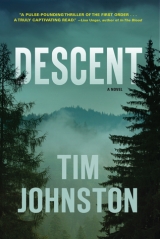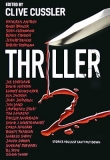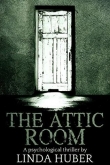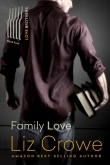
Текст книги "Descent"
Автор книги: Tim Johnston
Жанр:
Триллеры
сообщить о нарушении
Текущая страница: 18 (всего у книги 25 страниц)
49
The boy went to bed and Grant lay down on the sofa and remained there in the fitful light of the TV, watching the webbing up in the vigas, the dusty swags pulsing with color. Voices from the TV reached him in strange incantation, voices undertowed into dream and his dreams playing on before his open eyes, all of it vivid and repeating until at last the hours delivered the new day, its gray light in the windows, and still in this fevered state he sat up, hunched and exhausted. On the screen a woman stood at a rostrum in a purple robe, small black ball of microphone near her mouth. She spread her arms wide and he raised the remote and the screen went black.
The air outside chilled his sweat, his clammy, clinging shirt. Porch floorboards popped under his weight and he felt the burning cold of them through his socks. He inhaled too deeply and the air came retching back up and he stood gripping the post, convulsed less by the hacking than by the effort to stop it—until the cigarette was lit and he drew the calming smoke into his lungs.
Before him, across the clearing, the house was taking shape in the dawn. No movement and no sound anywhere but the first tentative notes of the birds.
He crushed the cigarette in the ashtray on the railing and went back inside and got into a dry shirt, and then he returned to the kitchen and set the coffee to brewing and stood at the window looking at the old man’s house, the light already changed. He poured coffee into a mug and left the mug sitting there. Across the way the windows were dark, upstairs and down. The rockers on the porch stilled and empty.
He looked at his watch, then drew his fingertips slowly over his jaw, as if he were deciding whether or not to shave. He stood that way for a long time. Then he pulled on his boots and got into his jacket and stepped once more into the cold morning. Down the cold popping steps and the pops returning to him in echo off the face of the old man’s house.
He wasn’t in the kitchen and there was no sound of the TV in the living room but Grant looked there anyway. No sound in the house at all but the tocking of the grandfather clock, and after he’d checked every place a man could be downstairs, he climbed the stairs heavily and he knocked and stood a moment with his hand on the knob, then opened the old man’s door and looked in and there was no need to say his name but he said it just the same.
“Em,” he said.
Silent and still in the big bed where he’d slept with his wife so many years. Silent and still and gray and so small in the big bed and all the heat gone out of the bed and out the body, and all the history and all the love gone out of it too.
Part IV
50
Billy Kinney lay against the headboard with the bunched pillow under his neck, watching the smoke in the middle space above him. It was so quiet he could hear the burning of the tobacco each time he inhaled. He lay very still, listening, and after a while he realized it was the grandfather clock at the foot of the stairs: sometime in the night it had wound down and ceased its ancient tock tock tock. He had seen the waxen and painted face, had heard the old pastor’s entreaties to God, the platitudes of the
condolent—but it was this, finally, the abandonment of habit, of sound, of time itself, that made it true and real.
Downstairs next to a half pot of coffee was a hundred-dollar bill and a message. This money is from me, not the estate. I’ll be back in a few days with the auction people.
“Good morning to you too, brother,” he said, his voice strange to himself.
No more sheriff now so no more neighbors bearing casseroles and pies. No more hard heels rapping the porch at dawn and the sheriff thanking them for the food and for the sympathies and seeing them off with no further awkwardness, for they’d come early and wished to leave early, before the other one came down, and wasn’t it just remarkable they asked each other as they drove away how two boys from such two good souls could grow up such entirely different kinds of boys? One of the mysteries of the Lord, they allowed, and always would be, but today our prayers are with them both.
He uncapped his lighter and held it to a corner of the note and watched the flames climb, the paper twisting and blackening until the ink purpled and rose again in a phantom script, the flame going at his fingers before he dropped it into the sink. He lit a cigarette and thought of Denise Gatskill in her black funeral dress. Hair done up and showing her neck. She had come by the house but he’d sent her away. Now he had money and he ought to take her down to the city, to a bar where they served the red wine she liked.
He stood before the window. Nothing moving out in the gray midday world. Not a bird in the sky and nothing stirring over at the old ranch house either. The blue Chevy gone and those two likely gone off with the sheriff for some brunch or to the diner on their own. Monday, Monday. He began to whistle but abruptly stopped and looked quickly over his shoulder—at what? Nothing. The empty kitchen. The view into the empty living room. Dark blank face of the TV. Nothing.
He grabbed his jacket from the chairback and frisked it for phone and wallet and keys and slapped up the hundred-dollar bill, and then he went out onto the porch and past the wooden rockers and down the steps and across the yellow and crusted and spongy turf. Rich stink of earth in the air, pungency of rootbeds and tunneling worms. Grass and hay and horseshit.
He drove by the cafe and he saw the blue Chevy there and drove on. He drove by the Gatskill house and he drove by his old high school up on the yellow and snow-scabbed hill, and everything he saw was old and tired and pitiful. It was as though he’d gone away for many years and had not seen the process that changed things but only the change itself, all at once, which was the same as seeing your own life gone by. Then he reached the interstate, and with the speakers pumping through him he gunned the El Camino and headed down toward Denver.
HE LEFT THE CLOUDS and the dregs of snow and descended into the full green outbreak of spring. There were good cheap places on the east side of the city but there was a place he liked on the west side with a billiards table and where you could still smoke and where if you got too lit you didn’t have to drive all the way back through town, through all that traffic and highway patrol. He also hoped to see an old boy he knew there, although this old boy wouldn’t show until much later if he showed at all.
It was just one o’clock in the afternoon when he pushed through the back door into the near-empty barroom; the room itself was hardly more than a passageway, dominated by the old Brunswick with its three good lion’s feet and a fourth blocky stump of blackened oak, its stained and burn-holed felt.
Behind the bar was Louis, the old man with the tremendous hands. Louis didn’t care for a song during the day and if someone got one going he’d limp over and unplug the machine and after that the billiards cracked more smartly, voices sailed, a girl’s laugh turned the heads of the daytime drunks.
Billy took a seat at the bar, leaving an empty stool between himself and two men who’d been talking quietly when he came in and who now stopped to watch him in the backbar mirror as he settled himself, as if he were a strange new development that might or might not be suffered.
Louis came and Billy asked for a seven-and-seven and the old man set to mixing it. In the mirror, beyond the image of himself, was the bright reflected square of the bar’s only window, and within that bright square were the shapes of a man and a woman. The man leaning close to tell her things no one else could hear in the hushed and daylit bar.
Louis centered the seven-and-seven on a bar coaster and Billy palmed the hundred-dollar bill down and the old man held the bill to the light, made change, and placed the smaller bills exactly where the hundred had been. Billy pushed two singles back and folded the remaining cash into his shirt pocket and raised his drink to Louis, who nodded, and he drank.
“Can a man still smoke in here, boss?” he said, and Louis said, “He can if these boys don’t mind,” and the two men turned to look at Billy—the far one older than the near one, who might’ve been a little older than Billy.
“Smoke ’em if you got ’em,” said the older man, and Billy looked to the younger, nearer man, this man staring at him for a moment from under the bill of his cap, then shrugging and facing forward again.
Billy said Much obliged and got one going. Louis placed the ashtray on the bar.
He drank. He smoked. The two men resumed their conversation, the older man monologuing low and steady, speaking about his wife, or his ex-wife, telling the younger man in the cap all the things he and the ex-wife had done in their marriage, good and bad. Billy ordered another drink and the man spoke about the things he would like to do to his ex-wife now, now that he was no longer blinded by love, and he said many graphic things he’d be sorry he said, Billy thought, if the woman ever turned up dead. If she wasn’t dead already. He stirred his drink and drew the little double-barreled swizzle between his lips and sipped at the fizzing glass brim.
“It’s like a man just goes along for years,” the man said, “and he thinks he’s living his life, he thinks he’s a normal Joe living his life with a normal woman, but he ain’t, he ain’t, and one day he sits up in bed and he sees his life for what it really is. Sees his wife for what she really is. You know what I’m talking about, Steve?”
The younger man nodded.
“Right, Steve?”
“Right,” said the younger man, Steve.
The man lifted his beer, swallowed, set it down again. “Same thing as when I was in the service, Steve, which, as I said, I ain’t at liberty to talk about. Five years of high-level shit and then, one day, boom, there I am, staring at myself in a mirror, covered in blood and no idea how or why. Same motherfucking day different motherfucking story.”
Billy caught his own eye in the backbar mirror. He ain’t never gonna stop, this old boy.
Well, I don’t see the chain keeping you here.
But the seven-and-seven was smooth and he had the twenties in his pocket and he sat watching Louis wash out glasses and dry them and set them in their places, big pint glasses that in the old man’s hands became abruptly, unbelievably smaller. When he came over to see if Billy wanted another, Billy ordered a beer just to watch the effect. He drank half the cold pint and then he stood up and walked to the men’s room, and when he returned, the talker was gone.
The other man named Steve sat staring into the mirror, one hand on what remained of his pint. Billy nodded at him in the mirror; Steve nodded back and both drank from their beers.
Louis wiped down the bar and stocked the cooler. Behind them, in the window, the man held the woman’s throat in his hand, she the wrist of that hand in hers.
“Quiet in here,” Billy said, and the man named Steve said, “Nice and quiet.” He sipped his beer and caught Billy’s eye in the mirror. “It must be a terrible burden,” he said, “having to keep so quiet.”
“How’s that?” said Billy.
Steve nodded to his right. “Military man,” he said. “Keeping it all locked in like that. Terrible burden.”
“Terrible,” said Billy. “He sure had some stories he couldn’t tell.”
Steve picked up a pair of sunglasses from the bar and frowned at the lenses. “I like a good story, don’t get me wrong. But a man should never be the hero of his own stories. Nobody likes those stories.” He jiggled the sunglasses, as though he were thinking about putting them on and going.
“Do you shoot?” Billy said.
The sunglasses stopped jiggling.
“Sorry?”
“I said do you shoot.”
Steve sidled his eyes at him. “Do I shoot what, bud?”
“Guns. Firearms.”
“What kind of a question is that?”
“A simple one. I saw your shades. Usually see those on boys at the range. Or po-lice. Or po-lice at the range.”
Steve regarded him. “You ever see me at the range, bud?”
“No. I don’t go there much myself.” He gave the man an easy smile. “Too many po-lice.”
“You think I’m a po-lice?”
“No, I’d wager you’re not.”
“Why would you wager that?”
“What’s a cop doing in a place like this?”
“Looking for bad men.”
“He’d be in the right place. But he wouldn’t have mud on his boots. A lawman can’t abide mud on his boots. Everybody knows that.”
Steve did not glance down at his boots. “You have some particular interest in my boots, bud?”
Billy smiled. Steve did not smile but neither did he appear hostile under the bill of the cap. Did not appear anything. The cap, entirely featureless and of a nameless color between green and brown, matched the canvas jacket he kept zipped to his throat, a bland and homespun uniform of unguessable protocols. Seated he somehow gave the impression of a man who, on his feet, would not be very big but whom you would not take lightly in a fight. It was early for a fight but men who drank in the daytime would fight in the daytime and Billy was one of them.
He didn’t want to fight. He was enjoying his drinking and he had the twenties in his pocket and he didn’t want to get thrown out by old Louis with his great hands.
“None whatsoever, Steve. Why don’t you let me buy you one?”
“Did you just call me Steve?”
“I did. I heard the military man say it before. What’s your pleasure?”
“My name isn’t Steve.”
“My mistake,” said Billy. “I must of misheard.” He teased one of the twenties from his pocket. “Mine ain’t bud, either. It’s Billy.” He floated the twenty to the bar and watched Louis come over. “Seven-and-seven for me, and whatever this man is drinking.”
“Same?” said Louis, and after a moment the man nodded.
They sat in silence until the drinks came and were paid for and Louis had been tipped.
“I thank you for the drink and I apologize for my rudeness,” the man said. “I guess I got all talked out by Mr. Covert-Ops.”
“My feelings ain’t hurt,” Billy said. “Cheers.”
“My name’s Joe,” the man said, offering his hand, and Billy laughed, shaking his hand.
“What’s funny?” said Joe.
“I got a brother named Joe.”
“That so?”
“Guess what he is.”
“What?”
“Po-lice.”
THEY DRANK A WHILE, and then this man Joe said: “Joe the cop”—
smiling for the first time.
“Joe the sheriff. Up in the mountains.”
“Which mountains are those?”
“Are there some other mountains around here?”
“There’s all kinds of mountains in the mountains, Billy.”
Billy looked over at him. The man looking back from under the bill. Still smiling.
“Brother Joe is sheriff in the Grand County mountains,” he said, and the man picked up his beer and sipped it.
“Grand County,” he said thoughtfully. “Grand County. Seems like there was something in the news with a sheriff from Grand County, while back.”
“Probably some drunk on skis waving a cap gun.”
“No,” said the man. “No, this had to do with a girl. Teenage girl went missing up there. Or am I misremembering?”
Billy gave him a frown of admiration. “Good recall, Joe. That was over two years ago.”
“You remember things like that. Things like that they stay with you.”
They drank. A tall man at the end of the bar stood, looked about, saw nothing that pleased him, and then seemed to follow his own wooden legs out the back door.
“There was this one boy I remember from grade school,” said Joe. He looked up from his beer, up from under the bill, and when Billy met his eyes in the mirror he looked down again and stared into his glass. As though pondering what he’d just said or what he would say next. Whether to say anything more at all.
“What boy was that?” said Billy, and Joe tilted his pint for a sip.
“That boy was Delmar Steadman. Plain, ordinary boy we all called Smellmar for some reason. He wasn’t fat or ugly or smelly or anything, but we’d decided to make him something to make fun of, I can’t even tell you why. Maybe because his daddy was the Roto-Rooter man. Maybe because he had a big sister named Bonnie who gave us all boners, I don’t know. Well. His backyard, Delmar’s backyard, came fence to fence with Becky Clark’s backyard, and those two had grown up making eyes at each other through that cyclone fence. Sneaking kisses, pressing up against one another before they even knew why. It happens. Happens all the time. Some people find the love of their lives at that age. Tell stories about it when they’re sixty, seventy years old.” He glanced at Billy in the mirror, raised his glass for a sip, and set it down again.
“Trouble was, at about age ten, Becky lost interest. Just dropped old
Delmar cold. We knew this the way you knew everything about everybody back then and not because of computers and cell phones either. You remember how that was, Billy?”
Billy said he did and the man went on.
“Well. Along came the summer between grade school and middle school. Magical summer. All of us shooting up like weeds, smell of chlorine and cut grass. It’s about the Fourth of July—day before or day after I don’t recall—and young Becky is out back suntanning on the patio. By now it’s been a good two years since she’s said a single word to Delmar, through that fence or at school or anywhere else. Fact is, she’s hardly even seen Delmar in all that time. The boy never comes out in the yard anymore, not even to play with that sorry little dog of his. The back door opens, dog goes out, pisses, shits, back door opens again and dog goes in. Like living next door to Boo Radley. You know who that is?”
Billy didn’t. It didn’t matter.
“So Becky’s out on the patio, which was nothing but a concrete slab with weeds growing in the cracks, catching some rays in that red bikini she wore that summer, oh Lord. Browning those arms, that stomach. Smell of coconut oil. She’s got the sunglasses on and the headphones going and she doesn’t hear him. Never even turns her head.”
The man fell silent, staring into his glass. He gave the glass a turn as if to set the contents in motion and thereby his story again.
“Her own daddy found her like that, Billy. Lying there in the July sun with those headphones still going and her little forehead pushed in like a bad melon. Glass of iced tea sweating on the concrete and a red Stillson wrench lying there beside it. You know what a Stillson wrench is, Billy?”
“Pipe wrench.”
“Big one. His daddy’s, about yea big.” He shook his head like a man in dismay. He drank.
After a minute Billy said: “Did they think he did it?”
“Think who?”
“Delmar’s daddy. The Roto-Rooter man.”
“They might of, at first. But then Delmar himself came out with the whole story.”
“What was the whole story?”
“What do you mean?”
“Why did he do it?”
“He said it just come to him. He couldn’t say why.”
Billy picked up his cigarettes and got one in his lips and lit it with the Zippo and set the Zippo carefully down again. He pulled on the cigarette and side-blew the smoke away from the man.
“What happened to him?” he said. “To Delmar.”
“They took him away. Becky’s folks got divorced and moved away. Old man Steadman moved away and we never saw nor heard another thing about any of those people again. The world just rolled on.” He lifted his beer and tilted back a drink. Made an adjustment to his cap. “I don’t know,” he said. “Sometimes I think he was just too young for himself, old Delmar.” He raised his glass again but didn’t drink. “I think if he’d of waited, if he’d of just let himself grow into himself, he’d of been all right.”
Billy drew on the cigarette and blew a slow cloud into the space between himself and the image of himself.
“I never told that story before,” the man said. “I wonder what made me tell it now. Talking this man’s ear off.”
THEY SAT. THEY DRANK. After a while the man drew the edge of his thumb over his lips corner to corner and said: “They ever find that girl?”
“What girl?”
“Up in those mountains.”
“No, they never did.”
The man shook his head. “How about that boy, then?”
Billy had drained his drink to the ice and was preparing to stand. “What boy is that?”
“There was a boy too, wasn’t there? A little brother or something? Got hurt up there on his bike?”
Billy looked at him.
“And she left him there,” the man said. “That girl. Threw a blanket on him and just left him there, as I recall.”
“That’s right,” Billy said. “A boy on a bike.”
“Where’s he at now? That boy?”
“Damned if I know. They were just tourists.” He raised his glass and tumbled an ice cube past his lips and broke it in his molars, the sound enormous and concussive in his skull. Then he said: “That boy wasn’t worth shit for evidence.”
“He wasn’t?”
“Anything he saw got knocked clean out of him.”
The man shook his head. “That’s a pity. That’s a flat-out pity.” He sat staring into his glass. “It sure is a funny world, isn’t it, Billy.”
“That’s one word for it.”
“What’s another one?”
“I don’t know.”
Billy sat another minute, and one minute more, then peeled off a five and got to his feet. “Gotta hit the road, Joe. But I’d like to buy you one more. Just for calling you Steve.”
“You’re off, Billy?”
“It looks like weather and I’m heading right into it.”
They both turned to look at the window behind them. The man and the woman were gone and the grayness that Billy had left in the hills had rolled down onto the city as though it sought him out.
“Good talking to you, Billy. Next time I’ll buy.”
“That’s a deal, Joe. You take her easy.”
“Drive safe now.”
Coldness had come down with the gray and it had a sharp coppery taste to it like blood. Three cars sat in the lot: his own El Camino, a burgundy and white Oldsmobile, and an old, high-sitting black Bronco with new mud on the tires and sprayed along the body in heavy four-wheel-drive patterns.
He stepped up to the Bronco on the passenger’s side and peered into the front seats and there was nothing in there but car. Seats, dash, floorboards. As if it were newly bought or up for sale. He looked more closely at the paint job and saw that it was not the original, nor the work of someone who painted cars for a living. He moved to the rear and bent to the tinted glass of the hardtop and saw in the cargo space an orderly array of gear: five-gallon gas can, fat coil of towing rope, a good-sized tool or tackle box, and two paper grocery bags, all of it seized in a black elastic webbing.
He stood and looked at the back door of the bar. He shook his head. “Shit,” he said, and walked away. Then he stopped and went back. He made a diving mask of his hands and peered inside again. One of the grocery bags was less than full and no way to tell what it held. In the other the tops of two boxes were visible, one box top rectangular and anonymously white, the other a square of light blue with the word Tampax in bright yellow.
He straightened and looked about him with his hands in his jacket pockets. His right hand playing the weight of the lighter around and around. He could feel the liquor swimming in his brain.
“Shit,” he said again. And turned and walked to his car.
He sat with the engine off and watched the first volley of sleet break across the glass. After a while he started the car and drove across the road to the 7-Eleven, backed into a space, and killed the engine again. He took his phone from his pocket and checked the time. Two thirty in the afternoon.
He drew on his cigarette and held the smoke, staring at the phone. Then he exhaled and dialed. The call was forwarded and a deputy answered and Billy asked to speak to the sheriff.
“He’s fairly jammed up right now, Billy. I’ll have him call you back.”
“I need to talk to him now, Denny. It’s critical.”
“Critical?”
“It’s important, Denny.”
“Donny. I’ll tell him to call you, Billy.”
Billy blew smoke from his nostrils and grinned. “I’d be very grateful, Donny.”
The sheriff called back an hour later. By then, Billy was climbing the interstate through a heavy sleet going to snow.
“Thanks for returning my call, Sheriff.”
“What is it, Billy?”
“I got a question for you.”
The sheriff, in his office, was going over some of his father’s—their father’s—old papers. Some so old the ink had begun to fade. “Ask it,” he said.
“Those Courtland kids, up on that mountain, when the girl went missing.”
The line was silent as the sheriff got his bearings. “What about them?”
“There’s something you never told anybody. Isn’t there.”
“Not following you, Billy.”
“There’s always something you don’t tell. That only the cops know about. That’s how it’s done, right? Procedurally speaking.”
“Billy, are you drunk?”
“I ain’t had a drop.”
“Sounds like you’re driving too.”
“Listen, God damn it. I just want to know what you didn’t tell nobody, that’s all. It’s a simple question.”
The sheriff was silent. Billy watched the fat wet flakes coming down. The dark grooves of tiretrack in the gray slurry of the road. The Bronco’s taillights simmering far ahead, hot and beady.
“If I didn’t tell nobody,” said his brother finally, “I didn’t tell nobody for a reason, so why would I tell you now?”
“Because I’m asking. Because who gives a damn now?”
The sheriff said nothing. Then: “You better get off the road, Billy. We got a storm up here and it’s headed down there.”
The line hissed and crackled. He was climbing higher now and losing his signal. He thought he’d lost it, was about to hang up when the sheriff said, “Go home, Billy. I mean it. Those folks ain’t none of your business now.”
“Now?” he laughed. “Hell, Sheriff, they never were.”








